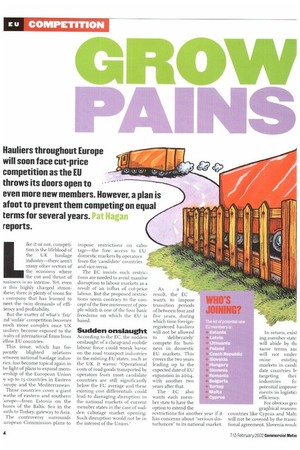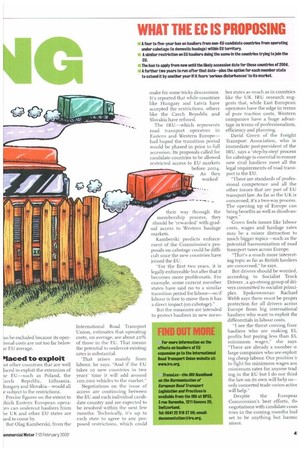L ike it or not, competition is the lifeblood of the
Page 44

Page 45

If you've noticed an error in this article please click here to report it so we can fix it.
UK haulage industry—there aren't many other sectors of the economy where the cut and thrust of )usiness is so intense. Yet, even n this highly charged atmos)here, there is plenty of room for i company that has learned to neet the twin demands of effi:iency and profitability.
But the matter of what's 'fair' :nd 'unfair' competition becomes nuch more complex once UK iauliers become exposed to the ivalry of international firms from 'ellow EU countries.
This issue, which has freluently blighted relations letween national haulage indusries, has become topical again in he light of plans to expand memlership of the European Union T up to 53 countries in Eastern :urope and the Mediterranean. These countries cover a giant wathe of eastern and southern :urope—from Estonia on the hores of the Baltic Sea in the :orth to Turkey, gateway to Asia. The controversy surrounds ,uropean Commission plans to impose restrictions on cabotage—the free access to EU domestic markets by operators from the 'candidate' countries 7 and vice-versa.
The EC insists such restrictions are needed to avoid massive disruption to labour markets as a result of an influx of cut-price labour, But the proposed restrictions seem contrary to the concept of the free movement of people which is one of the four basic freedoms on which the EU is based.
Sudden onslaught
According to the EC, the sudden onslaught of a cheap and mobile labour force could wreak havoc on the road transport industries in the existing EU states, such as the UK. It warns: "Operational costs of road goods transported by operators from most candidate countries are still significantly below the EU average and these existing cost differentials could lead to damaging disruption in the national markets of current member states in the case of sudden cabotage market opening. Such disruption would not be in the interest of the Union." As a
result, the EC wants to impose transition periods of between four and five years, during which time foreign. registered hauliers will not be allowed to 'deliberately' compete for business in domestic EU markets. This covers the two years leading up to the expected date of EU expansion in 2004, with another two years after that.
The EC also wants each member state to have the option to extend the restrictions for another year if it has concerns about "serious disturbances" to its national market.
alta ''.Cyprus
In return, exist ing member state will abide by th( same terms am will not under mine existim markets in candi date countries b; targeting thei
industries fo: potential improve ments in logistic: efficiency.
For obvious geo graphical reasons countries like Cyprus and Malta will not be covered by the transi tional agreement. Slovenia woulc
Iso be excluded because its opertional costs are not too far below )e EU average.
placed to exploit
lit other countries that are well laced to exploit the extension of le EU—such as Poland, the :zed] Republic, Lithuania, Iungary and Slovakia—would all c subject to the restrictions.
Precise figures on the extent to ihich Eastern European operaDrs can undercut hauliers from Fie UK and other EU states are lard to come by.
But Olag Kamberski, from the International Road Transport Union, estimates that operating costs, on average, are about zo% of those in the EU. That means the potential to undercut existing rates is substantial.
'That arises mainly from labour, he says. "And if the EU takes ro new countries in two years' time it will add around 100,000 vehicles to the market."
Negotiations on the issue of access are continuing between the EU and each individual candidate country and are expected to be resolved within the next few months. Technically, it's up to each state to agree to any proposed restrictions, which could make for some tricky discussions. It's reported that while countries like Hungary and Latvia have accepted the restrictions, others like the Czech Republic and Slovakia have refused.
The IRU—which represents road transport operators in Eastern and Western Europe— had hoped the transition period would be phased in prior to full accession. Its proposals called for candidate countries to be allowed restricted access to EU markets before zoo+ As they worked
their way through the membership process, they should be 'rewarded' with gradual access to Western haulage markets.
Kamberski predicts enforcement of the Commission's proposals on cabotage could be difficult once the new countries have joined the EU.
"For the first two years, it is legally enforceable but after that it becomes more problematic. For example, some current member states have said no to a similar transition period for labour—so if labour is free to move then it has a direct impact (on cabotage}." But the measures are intended to protect hauliers in new mem
her states as much as in countries like the UK. 1RU research suggests that, while East European operators have the edge in terms of pure traction costs, Western companies have a huge advantage in terms of professionalism, efficiency and planning.
David Green of the Freight Transport Association, who is immediate past-president of the IRU, says a 'step-by-step' process for cabotage is essential to ensure new rival hauliers meet all the legal requirements of road transport in the EU.
"There are standards of professional competence and all the other issues that are part of EU transport law. As far as the UK is concerned, it's a two-way process. The opening up of Europe can bring benefits as well as disadvantages."
Green feels issues like labour costs, wages and haulage rates may be a minor distraction to much bigger topics—such as the potential harmonisation of road transport taxes across Europe.
"That's a much more interesting topic as far as British hauliers are concerned," he says.
But drivers should be worried, according to Socialist Truck Drivers ,a 40-strong group of drivers committed to socialist principles. Spokeswoman Rachael Webb says there must be proper protection for all drivers across Europe from big international hauliers who want to exploit the differentials in labour costs.
"1 see the threat coming frore hauliers who are making EL profits but paying less than EL minimum wages," she says "There are already a number o. large companies who are exploit ing cheap labour. Our position ti to fight for minimum wages anc minimum rates for anyone trad ing in the EU but I do not thinl the law on its own will help us— only concerted trade union actior will help."
Despite the Europeat Commission's best efforts, till negotiations with candidate coun tries in the coming months lool set to be anything but harmc nious.
















































































































































